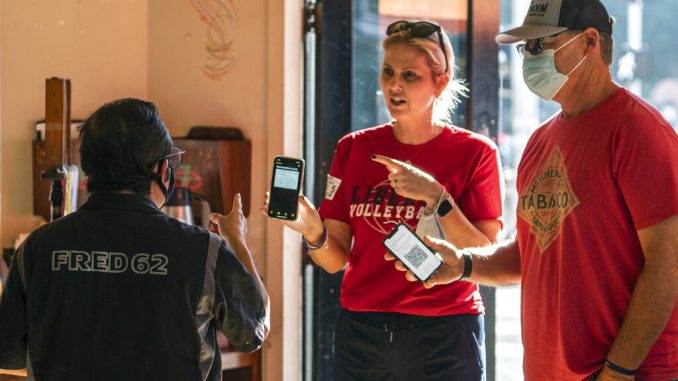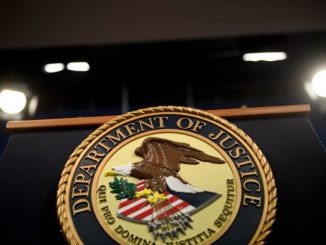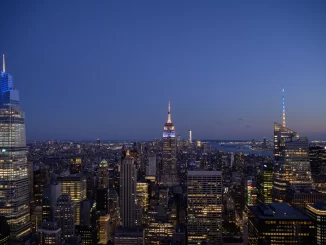

Patrons Naomi and Troy DeMontmorency, from Kern County, Calif., show their digital vaccination certificates to waiter Juan Rodrigues, left, before being allowed to enter the Fred 62 restaurant in the Los Feliz neighborhood of Los Angeles, Monday, Nov. 29, 2021. Enforcement began Monday in Los Angeles for one of the strictest vaccine mandates in the country, a sweeping measure that requires proof of COVID-19 shots for everyone entering a wide variety of businesses from restaurants to theaters and gyms to nail and hair salons. (AP Photo/Damian Dovarganes)
OAN Newsroom
UPDATED 9:37 AM PT – Tuesday, November 30, 2021
Los Angeles, a city known for its beaches, film industry and draconian COVID vaccine measures. The City of Angels began enforcing its SafePass L.A. ordinance on Monday. The measure is one of the strictest in the nation, forbidding patrons from entering indoor facilities without providing proof of vaccination.
The law affects a multitude of businesses, including bars, restaurants, salons and gyms. Los Angeles waiter Juan Rodrigues explained how the measure does not totally exclude the unvaccinated from eating out.
“Every time when a customer comes, eating at the restaurant, they have to have a vaccination card,” he explained. “That way they are allowed to come inside. If they want to sit outside on the patio, they don’t need the vaccination card.”
Although the mandate first went into effect earlier this month, businesses were given a grace period until its official enforcement date. The move coincides with the CDC broadening booster shot eligibility for adults due to the emergence of the Omicron variant.
Patrons such as Naomi DeMontmorency, however, believes SafePass L.A puts even more stress on already fledgling industries.
“I think it’s kind of silly, but myself I think it hurts the business owners,” she stated. “I feel like, you know, they’re trying to just make a living and do what they do in the service industry. And now they’re having to police vaccination cards and then they have to deal with people who don’t want to show it.”

Melanie Bolen, a personal trainer, shows her vaccination card before being allowed to sit inside the Fred 62 restaurant in the Los Feliz neighborhood of Los Angeles, Monday, Nov. 29, 2021. Enforcement began Monday in Los Angeles for one of the strictest vaccine mandates in the country, a sweeping measure that requires proof of COVID-19 shots for everyone entering a wide variety of businesses from restaurants to theaters and gyms to nail and hair salons. (AP Photo/Damian Dovarganes)
Other patrons, like Melanie Bolen, are more than happy to comply with the ordinance, believing it will help bring the crisis to a close.
“I was one of the first people to jump on the vaccination, so it doesn’t bother me because I’ve been getting them for everything my whole life,” she stated. “I believe in them and if you know if that’s what’s needed to help get things over with this pandemic, I’m all for it.”
No expiration date has been given for SafePass L.A. Businesses that break the ordinance will be fined between $1,000 and $5,000 per instance depending on number of previous violations.





Be the first to comment